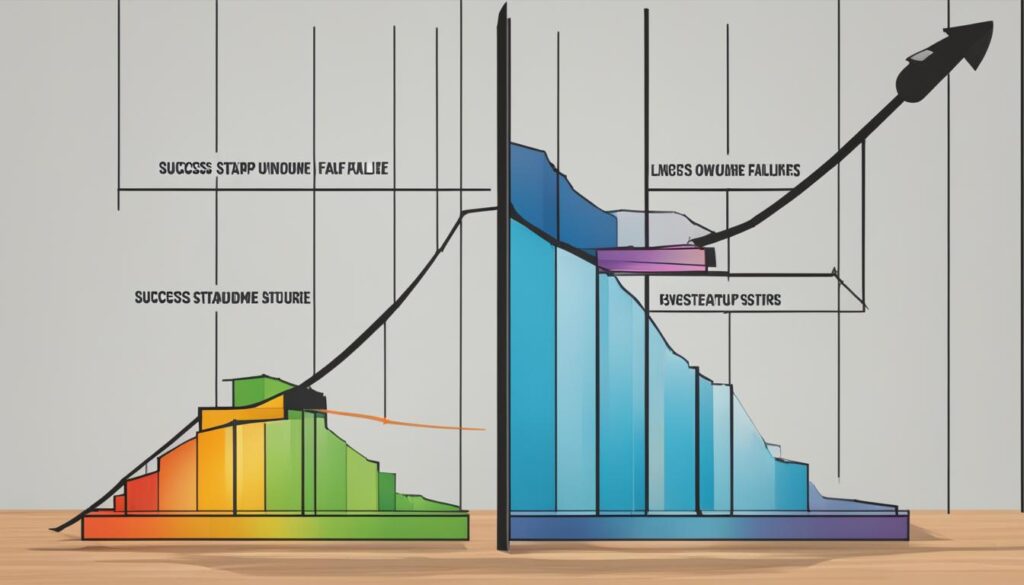What is your Opinion on Failure and Success of Any Startup: In the fast-paced world of startups, success and failure often go hand in hand. Many aspiring entrepreneurs fear failure, but we believe that it is an inevitable part of the journey to success. In fact, failure can be a valuable learning experience that leads to innovation, growth, and ultimately, success.

Startup leaders must understand that success is not a destination, but a continuous process of reflection, adaptation, and growth. It’s essential to evaluate startup performance and learn from both successes and failures along the way. Each failure can reveal flaws and weaknesses that need improvement, paving the way for a stronger and more resilient company.
It’s important not to let failure define or deter us. One success can overshadow multiple failures, and the key is to embrace the lessons learned and keep moving forward. Instead of fearing failure, we should fear contentment and stagnation. Failure should be seen as a stepping stone towards achieving startup success.
Furthermore, failure can also bring teams closer together if handled properly. It fosters a spirit of collaboration, problem-solving, and perseverance. By acknowledging failure as a natural part of the entrepreneurial journey, we can create an environment that encourages risk-taking and fosters resilience.
What is your Opinion on Failure and Success of Any Startup: Key Takeaways
- Failure is an inherent part of the startup journey and should be embraced as a learning opportunity.
- Success is not a destination but a continuous process of reflection, growth, and adaptation.
- Failure reveals flaws and weaknesses that need improvement, leading to the development of a stronger company.
- One success can overshadow multiple failures, so it’s important to not let failure hold us back from achieving startup success.
- Failure fosters collaboration, problem-solving, and perseverance, bringing teams closer together.
Reasons for Startup Failure and Success
Failure in startups can be attributed to various reasons. Studies have found that lack of focus, motivation, commitment, passion, and pride can contribute to startup failure. Taking advice from the wrong people and lacking mentorship can also hinder success. Lack of general and domain-specific business knowledge and raising too much money too soon are other factors that can lead to failure.
On the other hand, startup success can be influenced by factors such as market need, having the right team, effective pricing and marketing strategies, a solid business model, and customer focus. Analyzing both the reasons for failure and success can provide valuable insights for entrepreneurs.
Key reasons for startup failure:
- Lack of focus, motivation, commitment, passion, and pride
- Taking advice from the wrong people and lacking mentorship
- Lack of general and domain-specific business knowledge
- Raising too much money too soon
Factors influencing startup success:
- Market need
- The right team
- Effective pricing and marketing strategies
- A solid business model
- Customer focus
By understanding the factors that contribute to both failure and success, entrepreneurs can better position themselves for growth and overcome potential pitfalls.
When Did Game Theory Start on YouTube?
Embracing Failure for Innovation and Growth
In the fast-paced world of startups, failure is not something to be feared, but rather embraced as a valuable learning opportunity. It is through failure that we can foster innovation and drive growth. By embracing failure, we can spark creative solutions, challenge assumptions, and explore new possibilities that can propel our startups to success.
Take a look at some of the most successful companies today, like Airbnb and Uber. These industry disruptors were born out of initial failures and setbacks. They saw failure not as the end, but as a stepping stone towards something greater. Avoiding failure and playing it safe may seem comfortable, but it limits our potential for growth and innovation. Embracing failure, on the other hand, opens doors to new ideas and opportunities that we may have otherwise overlooked.
Failure also plays a crucial role in our personal development as entrepreneurs. It helps us cultivate resilience, perseverance, and problem-solving skills. When we learn from our failures, we improve our decision-making abilities and become better equipped to navigate the challenges that lie ahead. Real-life stories of successful companies born out of failure serve as a reminder of the importance of persistence, a willingness to learn, and adaptability.
So let us embrace failure as a catalyst for innovation and growth. Let us view it not as a roadblock but as a stepping stone on our journey to success. By learning from our failures, we can gain valuable insights, refine our strategies, and increase our chances of long-term success in the dynamic startup ecosystem.
FAQ
What is your opinion on the failure and success of any startup?
Failure is an inherent part of the journey to success in startups. Overcoming failure is essential for personal and business growth. Success is not a destination but a continuous journey of reflection, growth, and adaptation.
What are the reasons for startup failure and success?
Startup failure can be attributed to factors such as lack of focus, motivation, commitment, passion, and pride, as well as taking advice from the wrong people and lacking mentorship. On the other hand, startup success can be influenced by market need, having the right team, effective pricing and marketing strategies, a solid business model, and customer focus.
Why should failure be embraced for innovation and growth?
Failure should be embraced as a valuable learning opportunity in the startup world. It can lead to innovation and growth by sparking creative solutions and challenging assumptions. Many successful companies today were born out of initial failures. Learning from failure improves decision-making and problem-solving abilities.
